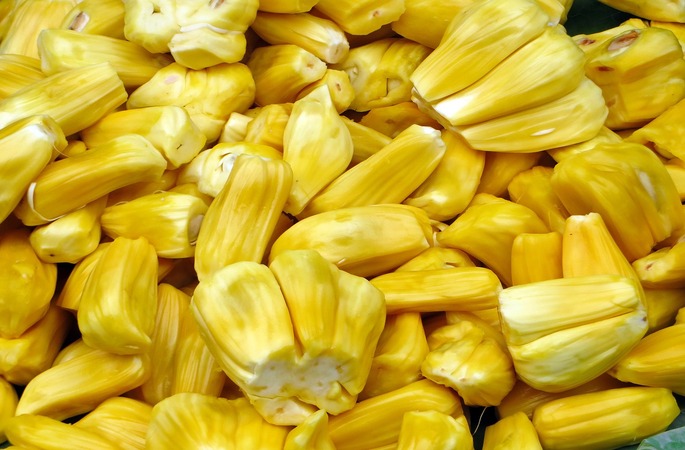Over time a family story can become a folktale of epic proportion, a true inspiration to all who hear it. This one is about my great-aunt Ammalu.
The story begins in a sleepy little village deep in south India. Ammalu and her sister Pearl grew up surrounded by countless cousins, aunts and uncles. Ammalu was the older sister, the one with a sense of adventure. She loved going on outings to visit neighbours and relatives. She had a knack for storytelling and an easy going nature. Pearl was shy and more at home in the kitchen with a flair for pastry making.
Little Ammalu was rumoured to have a sweet tooth. But, in those days, there were no candy or chocolate bars. So she indulged in what grew in her backyard, from large juicy mangoes and tasty papayas to bananas of all sizes, but her favourite was the jackfruit.
The jackfruits from our family orchards were legendary in their size and flavour. It would take two men to cut down the gigantic fruit and lug it into the family courtyard. The fresh fruit would be placed on an old cotton sari, and one of the men would use an enormous knife to cut into the tough skin. As the jackfruit was cut open, the entire courtyard would be filled with its fruity fragrance. The milky fluid from the jackfruit would flow onto the sari, and children would be held back so they wouldn’t get any sticky sap on their fingers. The women would be waiting to dip oily fingers into the cut fruit. The coconut oil was necessary to keep the sap from sticking onto fingers and eager hands. The tiny strands would be pushed aside to get into the thick pods of creamy yellow fruit. Each pod contained one large seed, which would be cleaned and saved for later use. The seed had a sweet, nutty taste, very similar to roasted chestnuts.
The best jackfruit was sweet and juicy with a hint of tartness and a pleasing crunch. Overripe jackfruit was sometimes stringy and too sweet. Ammalu loved this unique and delicious fruit. When everyone had enough fresh fruit, the leftovers were cooked down with jaggery sugar and stored in crockpots. In the cool pantry, the jackfruit jam fermented into caramel-like goo with a pungent odour that was pleasant only to the true fan of jackfruit. Ammalu must have had a discerning palate because she loved eating scoops of this odiferous jam. It was also made into special puddings.
Life in our tiny ancestral village was simple. There was not much in the way of entertainment, so everyone looked forward to visits from roaming troupes of actors. These troupes of mostly men would enact scenes from Indian myths and legends. Perhaps it was one of these actors who told Ammalu about the wonders of travel and of a special city dedicated to Lord Shiva.
This holy place was called Benares or Varanasi or Kashi and situated near the Bihar border in the faraway state of Uttar Pradesh. Visiting this sacred city and bathing in the even holier Ganges became an obsession with Ammalu. Perhaps one of the actors or someone in the family pointed out that after visiting Benares, the pilgrim would have to give up a favourite food. Ammalu knew what she would give up.
She was in her early 40s when she finally had an opportunity to take her dream trip. In the years after her pilgrimage, when relatives offered her a piece of fresh jackfruit, she would shake her head and say, “I just returned from Kashi,” Everyone immediately understood why she said no to her favourite snack. She died at the age of 88 and never tasted jackfruit again.
My family and I visited Benares a decade ago to scatter my uncle’s ashes. We found the city to be a study in contrasts. The grime and dirt didn’t deter the city’s beauty and timeless quality. The Ganges was a lazy ribbon of water with a lot of floating debris, but as I watched the orange glow of the tropical sunset, I couldn’t help feeling a deep sense of peace and calm. A holy city will do that to you. I imagined Ammalu must have experienced that same serenity as she bathed in the Ganges and vowed never to eat jackfruit again.
She would have never dreamed that her pilgrimage and personal sacrifice would inspire the next generation. Recently I challenged myself to give up sugar and test my willpower. Whenever I craved something sweet, I would recall the story of great-aunt Ammalu and jackfruit. Imagine how much she must have missed the taste of her favourite fruit.
The least tangible (and material) legacy we leave behind will endure the longest. Perhaps the next generation will remember you for your kindness, your grace under pressure or your selfless love. That is a legacy worth striving for!
Meera Ekkanath Klein confesses she hates jackfruit and would give it up without a second thought.



